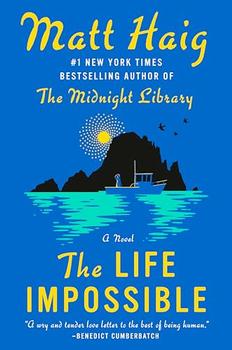Book Club Discussion Questions
Want to participate in our book club? Join BookBrowse and get free books to discuss!
Please be aware that this discussion guide will contain spoilers!
-
Throughout the book, Grace uses mathematical concepts, equations, and thinkers to understand the world around her. This often brings her comfort and allows her to cope with moments that unsettle or worry her. How do you see the world? Do you use a particular lens, like Grace, to explain certain phenomena?
-
Grace's kindness towards her student Maurice leads him to reach out to her for guidance years after they last spoke. Likewise, Christina gifts Grace her house because of her generosity decades earlier. What do these interactions show us about the importance of our interactions with acquaintances, and even strangers? How can we practice these small acts of kindness in our own lives?
-
By the time Grace arrives in Ibiza, she's an older woman: her husband has died, she's retired from her job, and her body suffers constant aches and pains. Many people—herself included—would say that her life's adventures are at an end, but they've only just begun. How do her experiences resist society's expectations for her age? How can we break out of labels and stereotypes in our own lives?
-
Ibiza is a multi-faceted place: it has party clubs, family resorts, natural areas, local communities, and more. What aspects of the island are most important to each of the characters? How do these seemingly separate areas interact and influence one another throughout the novel?
-
Many of the characters in this novel are family. There's Grace and her son Daniel, Christina and her daughter Lieke, and Alberto and his daughter Marta. How do these relationships vary from one another? How do they evolve as the story progresses? In what ways do characters find family outside of blood relations?
-
Grace's life shares interesting parallels with Art Butler's; both characters are haunted by the loss of a loved one. How, and why, do Grace and Art deal with their emotions differently? Is it possible to redirect grief into anger, or do we have to face it head-on to overcome it?
-
Throughout the novel, characters give each other gifts big and small: Christina leaves her house to Grace, Grace gives Christina her St. Christopher's pendant, La Presencia gifts certain people powers. Are some of these gifts more significant than others, and if so, how? What does it mean to give a gift with no expectation of reciprocation? Is there a gift you've received that means a great deal to you?
-
Grace has suffered many personal losses in her life. She has carried a lot of grief. And it's the loss of a friend that brings her to the island in the first place. Over the course of the book, something happens that changes how she feels about grief. What is it that she learns? What have you noticed about how different people manage loss?
-
At one point in the novel, Lieke says, "How can you live a life if you know everything that is going to happen?" And Grace observes, "The gift of La Presencia was also its curse." Do you think it's important to have mystery in life, or do you prefer to avoid surprises? Can we change the future with our actions, or is it set in stone? In what ways can we sometimes surprise ourselves?
-
The environment is an important presence throughout the novel as Grace and her companions fight to save Ibiza's natural landscapes from man-made destruction. How is nature important to the characters and communities in the book? How is nature important to you? What does La Presencia teach Grace, and us, about the significance of life big and small?
-
"Depression is always smaller than you, even when it feels vast," writes Matt Haig in his memoir Reasons to Stay Alive. "It operates within you, you do not operate within it." How does Grace's journey embody this philosophy? In what ways can we find joy even when our sadness feels insurmountable? How does appreciation for the small moments in life allow us to overcome big emotions such as grief?
Unless otherwise stated, this discussion guide is reprinted with the permission of Viking. Any page references refer to a USA edition of the book, usually the trade paperback version, and may vary in other editions.
